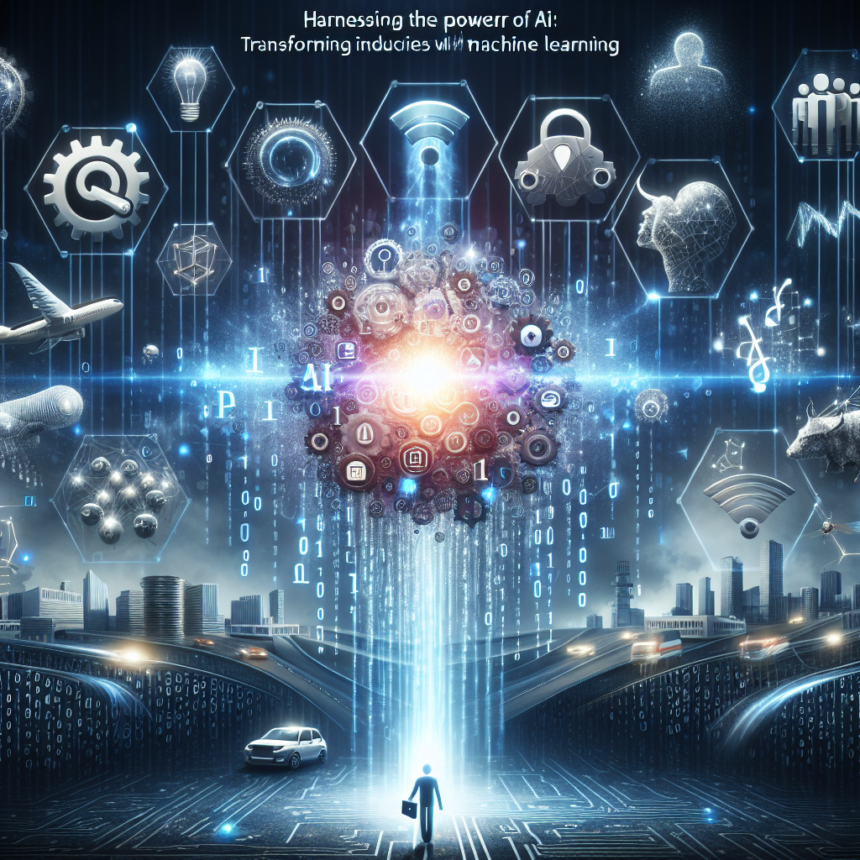Artificial Intelligence (AI) has emerged as one of the most transformative technologies of the 21st century. Among its many facets, machine learning (ML)—a subset of AI—has garnered significant attention for its ability to learn from data and improve over time without explicit programming. Industries worldwide are beginning to harness the power of AI and machine learning to enhance efficiency, reduce costs, and drive innovation. This article explores how various sectors are leveraging these technologies and what the future may hold.
The Role of Machine Learning in Key Industries
1. Healthcare
In the healthcare sector, machine learning is revolutionizing patient care and operational efficiency. By analyzing vast quantities of medical data, machine learning algorithms can help predict patient outcomes, personalize treatment plans, and speed up drug discovery processes. For instance, ML tools can predict the likelihood of specific diseases based on individual patient data, enabling early intervention.
2. Finance
The finance industry has not been left behind in the AI revolution. Machine learning algorithms are effectively being used for fraud detection, algorithmic trading, and credit scoring. By analyzing historical transaction data, these algorithms can identify unusual patterns and flag potentially fraudulent activities in real time. Furthermore, robo-advisors use ML to provide personalized investment advice, making financial services more accessible and tailored.
3. Retail
Retailers have also begun to capitalize on machine learning to optimize inventory management, enhance customer experience, and drive sales. By analyzing consumer behavior, ML can predict trends and help businesses better manage stock levels. Furthermore, personalized marketing campaigns can be designed through customer segmentation and targeting, boosting customer loyalty and engagement.
4. Manufacturing
In the manufacturing sector, AI and machine learning are enhancing production processes and reducing downtime. Predictive maintenance powered by machine learning analyzes equipment performance data to predict failures before they happen, efficiently scheduling repairs and minimizing disruptions. Moreover, AI-driven robotics are improving assembly line efficiency through adaptive learning, allowing machines to optimize their performance based on real-time feedback.
5. Transportation
Transportation is another industry tapping into the potential of machine learning. Companies like Tesla and Waymo are using deep learning algorithms to develop autonomous vehicles that can navigate safely in complex environments. In logistics, ML is helping optimize routes and reduce fuel consumption, leading to significant cost savings.
Future Implications of AI and ML
As industries continue to adopt machine learning, the future appears bright. We can expect increased automation across sectors, resulting in enhanced productivity. However, the rise of AI and machine learning also presents challenges, such as job displacement and ethical considerations surrounding data privacy. It is imperative for businesses and policymakers to address these issues proactively, ensuring that the benefits of AI are equitably distributed.
Additionally, the advancement of machine learning models includes incorporating more sophisticated algorithms that can analyze unstructured data, such as images and text. This evolution will lead to even broader applications across sectors, from customer service chatbots powered by natural language processing to enhanced visual recognition systems in security.
Conclusion
Harnessing the power of AI and machine learning presents a unique opportunity for industries to revolutionize their operations and better serve their customers. From healthcare to transportation, businesses that effectively adopt these technologies will have a competitive edge in the marketplace. It is crucial, however, to proceed thoughtfully, ensuring ethical considerations are taken into account as we integrate AI into our everyday lives. The potential of these technologies is profound, setting the stage for innovations we have yet to imagine.
FAQs
Q1: What is machine learning?
A1: Machine learning is a subset of AI that enables systems to learn from data, identify patterns, and make decisions with minimal human intervention.
Q2: How does machine learning impact businesses?
A2: Machine learning helps businesses optimize processes, enhance customer experiences, reduce costs, and improve decision-making through data-driven insights.
Q3: Is machine learning only applicable to large enterprises?
A3: No, businesses of all sizes can leverage machine learning. There are numerous accessible tools and platforms that allow small and medium-sized enterprises to implement ML solutions.
Q4: What ethical concerns are associated with AI and machine learning?
A4: Ethical concerns include data privacy, job displacement, algorithmic bias, and the need for transparency in AI decision-making.
Q5: What is the future of AI and machine learning?
A5: The future of AI and machine learning looks promising with advancements in deep learning, increasing accessibility of technology, and broader applications across various industries, though challenges must be addressed responsibly.
